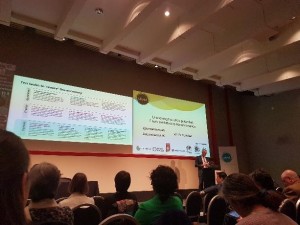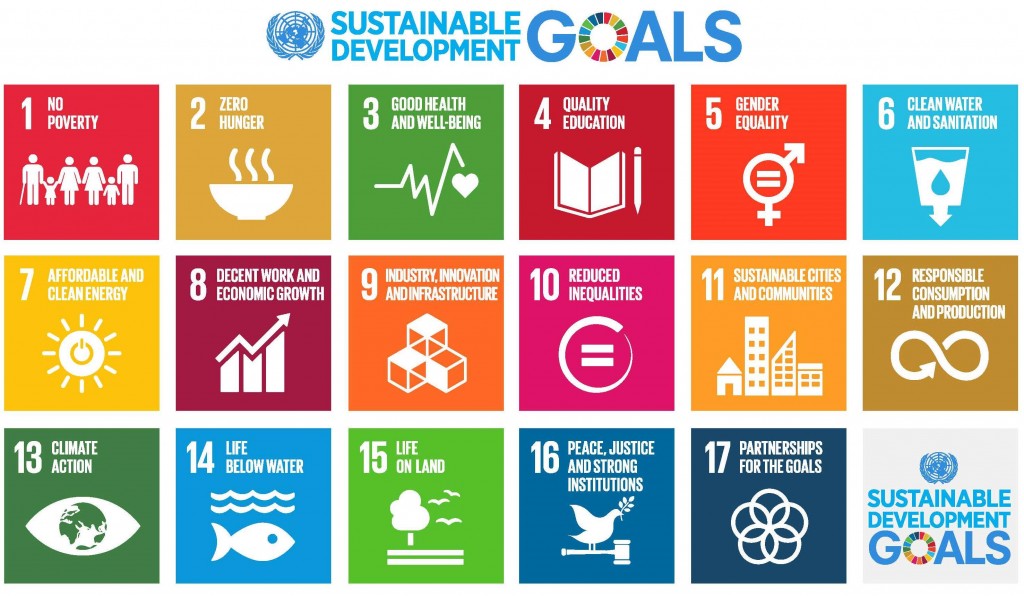King’s is now a member of the Sustainable Restaurant Association (SRA), enabling the university to provide more ethical and sustainably sourced food. King’s Food have also signed up to the SRA’s core programme, “Food Made Good”.
Food can have a significant environmental and social footprint. Examples of this are production methods that may harm the environment, such as destruction of habitats and therefore loss of wildlife for agriculture, exploitation of workers in the developing world, or wasteful practices that mean food produced never makes it to our plates. Recently, MPs have called on supermarkets to help reduce the £10 billion worth of food thrown away every year, for example by clearing up confusion around ‘Best Before’ labels. There are now many initiatives to help cut food waste.
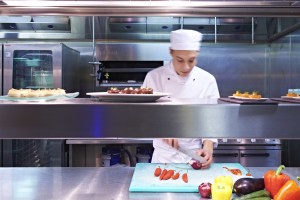 The Sustainable Restaurant Association is a not-for-profit that started in 2010, and now has over 6,000 member sites nation-wide. The Sunday Times has even nicknamed their rating system the “Michelin Stars of Sustainability“.
The Sustainable Restaurant Association is a not-for-profit that started in 2010, and now has over 6,000 member sites nation-wide. The Sunday Times has even nicknamed their rating system the “Michelin Stars of Sustainability“.
The star rating is based on the SRA’s Food Made Good framework, made up of 14 key areas built on three pillars:
- Sourcing: This category focuses on how food at the university is sourced. This means local and seasonal produce, ethical meat & dairy, environmentally positive farming, sustainable fish and buying fair trade.
- Society: The society criteria focus on the impacts of food on people: fair treatment of workers, healthy and balanced menus, responsible marketing and communication with customers, and engagement with the community, e.g. local schools.
- Environment: This focuses on the environmental impacts food may have: the supply chain of goods, waste management (including food waste), sustainable workplace resources, improving energy efficiency and saving water.
In the near future, King’s Food will be reviewed in these areas, and if scoring highly, awarded a rating out of three stars. Being part of the programme will help King’s Food to continuously improve sustainability in restaurants at King’s. The university joins a diverse range of SRA members, such as national chains like Wahaca and Jamie’s Italian, a number of universities, and even the Eurostar.
In addition to being a member of the SRA, King’s is currently working towards becoming a Fairtrade University.


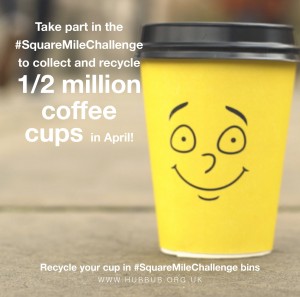 The aim of the challenge is to recycle half a million paper coffee cups in the month of April. Coffee cups have been getting lots of bad press recently, as seven million of them are thrown away every single day – that’s 4000 a minute! The problem with this mountain of coffee cups is that less than 1% of them are recycled. While they are recyclable in theory, this does not happen in practice. The reason for this is the plastic lining inside the cup, which is almost impossible to separate from the paper. As a result, the coffee cups are either incinerated, or worse, end up in landfill.
The aim of the challenge is to recycle half a million paper coffee cups in the month of April. Coffee cups have been getting lots of bad press recently, as seven million of them are thrown away every single day – that’s 4000 a minute! The problem with this mountain of coffee cups is that less than 1% of them are recycled. While they are recyclable in theory, this does not happen in practice. The reason for this is the plastic lining inside the cup, which is almost impossible to separate from the paper. As a result, the coffee cups are either incinerated, or worse, end up in landfill.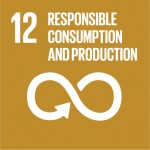 And not just for the environment – it can save you money too! King’s Food will give you a free hot drink if you buy a KeepCup from them. If you already have one, you get 10p off your drink every time you use it. Starbucks will give you 25p off your drink if you bring your own cup, and Caffe Nero will give you double stamps for your loyalty card.
And not just for the environment – it can save you money too! King’s Food will give you a free hot drink if you buy a KeepCup from them. If you already have one, you get 10p off your drink every time you use it. Starbucks will give you 25p off your drink if you bring your own cup, and Caffe Nero will give you double stamps for your loyalty card.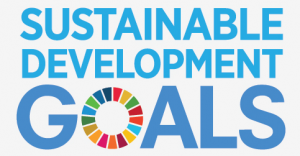 The conference started with a keynote speech by Amanda MacKenzie OBE, who highlighted the importance of getting everyone involved. When the SDGs were unveiled, she ran a campaign to get word about them out there. One of the key messages of this was the importance of using simple language everyone understands. This is why she refers to the goals as Global Goals rather than SDGs, claiming the term SDGs “sounds like something you would see your doctor about”. By calling them the Global Goals and making them accessible, we should be able to take millions of small, simple actions, together adding up to significant change.
The conference started with a keynote speech by Amanda MacKenzie OBE, who highlighted the importance of getting everyone involved. When the SDGs were unveiled, she ran a campaign to get word about them out there. One of the key messages of this was the importance of using simple language everyone understands. This is why she refers to the goals as Global Goals rather than SDGs, claiming the term SDGs “sounds like something you would see your doctor about”. By calling them the Global Goals and making them accessible, we should be able to take millions of small, simple actions, together adding up to significant change.